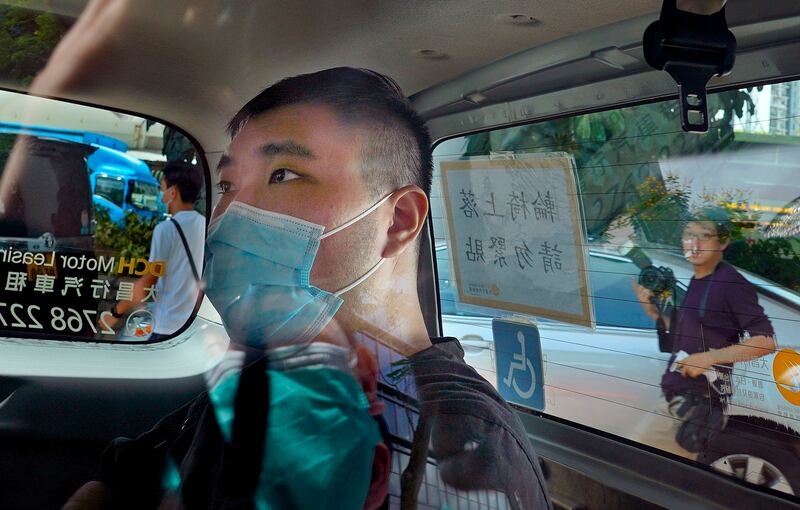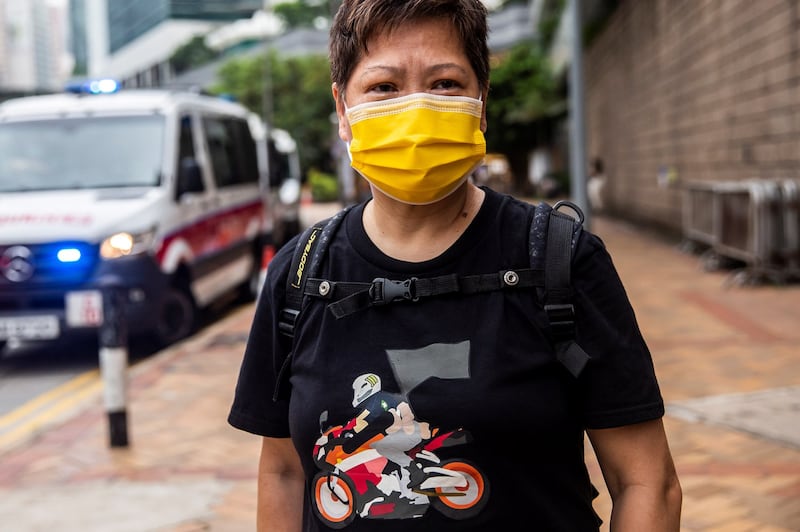A court in Hong Kong on Tuesday convicted the first person to be tried under a draconian national security law imposed on the city by Beijing of "terrorism" and "inciting secession" after he flew a banned protest slogan from his motorbike during protests against the law on July 1, 2020.
Tong Ying-kit, 24, was arrested by a group of police officers as he rode a motorbike at a protest against the law, carrying a flag bearing the words "Free Hong Kong, revolution now!"
A panel of three judges, but no jury, found Tong guilty of having incited secession with his banner reading "Free Hong Kong, Revolution now!"
The judges found that while the slogan of the 2019 protest movement may mean different things to different people, the fact that it can represent resistance to the ruling Chinese Communist Party (CCP)'s control over the city was enough to convict Tong.
Prosecutors had argued that the "Free Hong Kong" part of the slogan on Tong's flag implied the city needed to be rescued from an enemy, the CCP, while "Revolution now!" implied a rejection of Chinese rule over the city.
"We have no difficulty in coming to the sure conclusion that the slogan as at 1 July 2020 was capable of carrying the meaning of separating [Hong Kong] from [mainland China] and was capable of inciting others to commit secession," the judges said in their ruling.
"We are also sure that the defendant fully understood the slogan to bear the meaning of Hong Kong independence and by displaying, in the manner he did, the flag bearing the slogan, the defendant intended to convey the secessionist meaning of the slogan as understood by him to others and he intended to incite others to commit acts separating [Hong Kong] from [mainland China]."
The once-ubiquitous 2019 protest movement slogan was banned under the national security law, which criminalizes public criticism of the authorities.
Tong appeared calm as the ruling was passed, raising his hand to wave to his family in the public gallery. A woman shouted back "Hang in there! Love you!"

Impact of verdict feared
Outside the court, a supporter who gave only the surname Lee said she had worn black clothing and a T-shirt with an image of Tong riding a motorcycle to show her support for him.
"It seems that if you're young, you're guilty now," Lee said, adding that she wasn't optimistic about the sentence.
"I wouldn't be surprised if he got more than 10 years; they are going to sentence it more harshly because it's the first ever case, and they want to scare the people of Hong Kong," she said.
Eric Lai, a Hong Kong law fellow at the Asia Law Center of Georgetown University, said the verdict was arrived at under an unreasonable system, which denied Tong a jury trial.
"The court found that Tong Ying-kit’s actions, his driving, and his behavior towards police officers coupled with his political opinions constituted the crime of terrorism," Lai said. "Such a threshold for conviction is quite worrying."
"The scope of crimes that can be regarded as terrorism is [now] quite extensive."
He said the ruling will likely also affect judgments in cases not brought under the national security law.
Tong, who has been held on remand for nearly a year, with repeated applications for bail and a writ of habeas corpus rejected by judges, pleaded not guilty to all of the charges.

First aid kit
National security judges Esther Toh, Anthea Pang and Wilson Chan also found that Tong's actions were aimed at "intimidating the public in order to pursue a political agenda," and also found him guilty of "terrorism."
"In our view, a blatant and serious challenge mounted against the police force which is charged with the responsibility of maintaining public safety and security, and thus a symbol of law and order, will certainly instill a sense of fear amongst the law-abiding members of the public, in particular, apprehension of a breakdown of a safe and peaceful society into a lawless one. In that event, grave harm would certainly be caused to the society," the judgment said.
The defense told the court during the trial that Tong had tried to avoid driving into the police officers, and noted he had in his possession a first-aid kit, far from the action that would be expected of a terrorist.
The charges carry a maximum sentence of life imprisonment.
The national security law, which saw China's feared state security police set up a headquarters in Hong Kong to oversee "serious" cases, has been widely criticized by governments, rights groups, and lawyers as an assault on Hong Kong's traditional freedoms of speech, association, and political participation.
It bans both words and actions deemed "secessionist," "seditious," "subversive," or linked to "terrorism," as well as speech that is critical of the Hong Kong government or the CCP, on pain possible life imprisonment.
On Jan. 6, 2021, 53 pro-democracy activists and former opposition lawmakers were arrested for "subversion" under the law after they held a democratic primary designed to maximize their chances of winning seats in the Legislative Council (LegCo).
The authorities responded by postponing the election and arresting those who took part in the primary.
Of those arrested, 47 currently await trial on "subversion" charges, with 12 granted bail -- some only after several months in detention -- and the rest remaining in prison pending trial.
Translated and edited by Luisetta Mudie.
